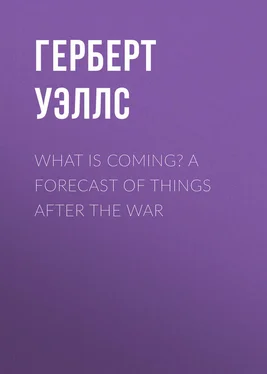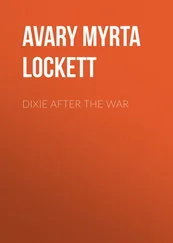Герберт Уэллс - What is Coming? A Forecast of Things after the War
Здесь есть возможность читать онлайн «Герберт Уэллс - What is Coming? A Forecast of Things after the War» — ознакомительный отрывок электронной книги совершенно бесплатно, а после прочтения отрывка купить полную версию. В некоторых случаях можно слушать аудио, скачать через торрент в формате fb2 и присутствует краткое содержание. Жанр: История, foreign_prose, на английском языке. Описание произведения, (предисловие) а так же отзывы посетителей доступны на портале библиотеки ЛибКат.
- Название:What is Coming? A Forecast of Things after the War
- Автор:
- Жанр:
- Год:неизвестен
- ISBN:нет данных
- Рейтинг книги:3 / 5. Голосов: 1
-
Избранное:Добавить в избранное
- Отзывы:
-
Ваша оценка:
- 60
- 1
- 2
- 3
- 4
- 5
What is Coming? A Forecast of Things after the War: краткое содержание, описание и аннотация
Предлагаем к чтению аннотацию, описание, краткое содержание или предисловие (зависит от того, что написал сам автор книги «What is Coming? A Forecast of Things after the War»). Если вы не нашли необходимую информацию о книге — напишите в комментариях, мы постараемся отыскать её.
What is Coming? A Forecast of Things after the War — читать онлайн ознакомительный отрывок
Ниже представлен текст книги, разбитый по страницам. Система сохранения места последней прочитанной страницы, позволяет с удобством читать онлайн бесплатно книгу «What is Coming? A Forecast of Things after the War», без необходимости каждый раз заново искать на чём Вы остановились. Поставьте закладку, и сможете в любой момент перейти на страницу, на которой закончили чтение.
Интервал:
Закладка:
Quickly thereafter the last phase will be developing into predominance, in which each group of nations will be most concerned, no longer about victories or conquests, but about securing for itself the best chances of rapid economic recuperation and social reconstruction. The commercial treaties, the arrangements for future associated action, made by the great Allies among themselves will appear more and more important to them, and the mere question of boundaries less and less. It will dawn upon Europe that she has already dissipated the resources that have enabled her to levy the tribute paid for her investments in every quarter of the earth, and that neither the Germans nor their antagonists will be able for many years to go on with those projects for world exploitation which lay at the root of the great war. Very jaded and anaemic nations will sit about the table on which the new map of Europe will be drawn… Each of the diplomatists will come to that business with a certain pre-occupation. Each will be thinking of his country as one thinks of a patient of doubtful patience and temper who is coming-to out of the drugged stupor of a crucial, ill-conceived, and unnecessary operation … Each will be thinking of Labour, wounded and perplexed, returning to the disorganised or nationalised factories from which Capital has gone a-fighting, and to which it may never return.
III. NATIONS IN LIQUIDATION
The war has become a war of exhaustion. One hears a great deal of the idea that "financial collapse" may bring it to an end. A number of people seem to be convinced that a war cannot be waged without money, that soldiers must be paid, munitions must be bought; that for this money is necessary and the consent of bank depositors; so that if all the wealth of the world were nominally possessed by some one man in a little office he could stop the war by saying simply, "I will lend you no more money."
Now, as a matter of fact, money is a power only in so far as people believe in it and Governments sustain it. If a State is sufficiently strong and well organised, its control over the money power is unlimited. If it can rule its people, and if it has the necessary resources of men and material within its borders, it can go on in a state of war so long as these things last, with almost any flimsy sort of substitute for money that it chooses to print. It can enrol and use the men, and seize and work the material. It can take over the land and cultivate it and distribute its products. The little man in the office is only a power because the State chooses to recognise his claim. So long as he is convenient he seems to be a power. So soon as the State is intelligent enough and strong enough it can do without him. It can take what it wants, and tell him to go and hang himself. That is the melancholy ultimate of the usurer. That is the quintessence of "finance." All credit is State-made, and what the State has made the State can alter or destroy.
The owner and the creditor have never had any other power to give or withhold credit than the credit that was given to them. They exist by sufferance or superstition and not of necessity.
It is the habit of overlooking this little flaw in the imperatives of ownership that enables people to say that this war cannot go on beyond such and such a date-the end of 1916 is much in favour just now-because we cannot pay for it. It would be about as reasonable to expect a battle to end because a landlord had ordered the soldiers off his estate. So long as there are men to fight and stuff to fight with the war can go on. There is bankruptcy, but the bankruptcy of States is not like the bankruptcy of individuals. There is no such thing among States as an undischarged bankrupt who is forbidden to carry on. A State may keep on going bankrupt indefinitely and still carry on. It will be the next step in our prophetic exercise to examine the differences between State bankruptcy and the bankruptcy of a subject of the State.
The belligerent Powers are approaching a phase when they will no longer be paying anything like twenty shillings in the pound. In a very definite sense they are not paying twenty shillings in the pound now. That is not going to stop the war, but it involves a string of consequences and possibilities of the utmost importance to our problem of what is coming when the war is over.
The exhaustion that will bring this war to its end at last is a process of destruction of men and material. The process of bankruptcy that is also going on is nothing of the sort. Bankruptcy destroys no concrete thing; it merely writes off a debt; it destroys a financial but not an economic reality. It is, in itself, a mental, not a physical fact. "A" owes "B" a debt; he goes bankrupt and pays a dividend, a fraction of his debt, and gets his discharge. "B's" feelings, as we novelists used to say, are "better imagined than described"; he does his best to satisfy himself that "A" can pay no more, and then "A" and "B" both go about their business again.
In England, if "A" is a sufficiently poor man not to be formidable, and has gone bankrupt on a small scale, he gets squeezed ferociously to extract the last farthing from him; he may find himself in jail and his home utterly smashed up. If he is a richer man, and has failed on a larger scale, our law is more sympathetic, and he gets off much more easily. Often his creditors find it advisable to arrange with him so that he will still carry on with his bankrupt concern. They find it is better to allow him to carry on than to smash him up.
There are countless men in the world living very comfortably indeed, and running businesses that were once their own property for their creditors. There are still more who have written off princely debts and do not seem to be a "ha'p'orth the worse." And their creditors have found a balm in time and philosophy. Bankruptcy is only painful and destructive to small people and helpless people; but then for them everything is painful and destructive; it can be a very light matter to big people; it may be almost painless to a State.
If England went bankrupt in the completest way to-morrow, and repudiated all its debts both as a nation and as a community of individuals, if it declared, if I may use a self-contradictory phrase, a permanent moratorium, there would be not an acre of ploughed land in the country, not a yard of cloth or a loaf of bread the less for that. There would be nothing material destroyed within the State. There would be no immediate convulsion. Use and wont would carry most people on some days before they even began to doubt whether So-and-so could pay his way, and whether there would be wages at the end of the week.
But people who lived upon rent or investments or pensions would presently be very busy thinking how they were going to get food when the butcher and baker insisted upon cash. It would be only with comparative slowness that the bulk of men would realise that a fabric of confidence and confident assumptions had vanished; that cheques and bank notes and token money and every sort of bond and scrip were worthless, that employers had nothing to pay with, shopkeepers no means of procuring stock, that metallic money was disappearing, and that a paralysis had come upon the community.
Such an establishment as a workhouse or an old-fashioned monastery, living upon the produce of its own farming and supplying all its own labour, would be least embarrassed amidst the general perplexity. For it would not be upon a credit basis, but a socialistic basis, a basis of direct reality, and its need for payments would be incidental. And land-owning peasants growing their own food would carry on, and small cultivating occupiers, who could easily fall back on barter for anything needed.
The mass of the population in such a country as England would, however, soon be standing about in hopeless perplexity and on the verge of frantic panic-although there was just as much food to be eaten, just as many houses to live in, and just as much work needing to be done. Suddenly the pots would be empty, and famine would be in the land, although the farms and butchers' shops were still well stocked. The general community would be like an automobile when the magneto fails. Everything would be there and in order, except for the spark of credit which keeps the engine working.
Читать дальшеИнтервал:
Закладка:
Похожие книги на «What is Coming? A Forecast of Things after the War»
Представляем Вашему вниманию похожие книги на «What is Coming? A Forecast of Things after the War» списком для выбора. Мы отобрали схожую по названию и смыслу литературу в надежде предоставить читателям больше вариантов отыскать новые, интересные, ещё непрочитанные произведения.
Обсуждение, отзывы о книге «What is Coming? A Forecast of Things after the War» и просто собственные мнения читателей. Оставьте ваши комментарии, напишите, что Вы думаете о произведении, его смысле или главных героях. Укажите что конкретно понравилось, а что нет, и почему Вы так считаете.

![Герберт Уэллс - The War of the Worlds [С англо-русским словарем]](/books/26611/gerbert-uells-the-war-of-the-worlds-s-anglo-thumb.webp)










